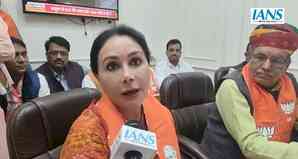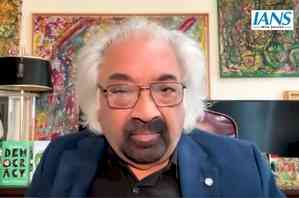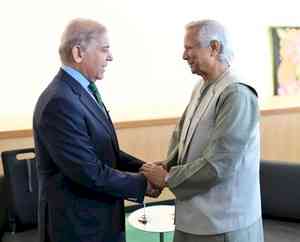Govt's online gaming reforms must gain momentum to arrest a colossal tax loss of Rs 3.89 lakh cr
While the ICC Men's Cricket World Cup is underway, Think Change Forum (TCF), an independent think tank dedicated to innovative ideas, has released a report titled "State of the betting & gambling industry in India" that has lauded the Indian government for swift action to regulate online betting in the country.

New Delhi, Oct 19 (IANS) While the ICC Men's Cricket World Cup is underway, Think Change Forum (TCF), an independent think tank dedicated to innovative ideas, has released a report titled "State of the betting & gambling industry in India" that has lauded the Indian government for swift action to regulate online betting in the country.
The report lauds the government for introducing a progressive regulatory framework by proposing to amend the IT rules to regulate online gaming and setting up of self-regulating bodies called SRO’s.
However, unless these measures are rolled out rapidly, the new GST regime will divert growth from legal gaming to illegal betting and offshore players.
As per the report, the offshore sports betting market receives an estimated Rs 8.2 lakh crore (USD 100 billion) per annum in deposits from India and has been clocking a rapid growth of 20 per cent per annum in the last three years post the pandemic. Factors such as digital infrastructure growth, smartphone usage, and the expansion of athletic events have contributed to this growth. In India, despite regulatory restrictions, country's betting and gambling market has shown remarkable growth.
According to the report at a baseline estimated deposits of Rs 8,20,000 crore (USD 100 billion), being received from India, at current GST rate of 28 per cent, India is losing a GST collection of Rs 2,29,600 crore, per annum. In addition is TDS on player earnings which are estimated to be 90 per cent of post GST deposits. This works out to another Rs 1,59,408 crore in taxes, making the total tax loss stand at Rs 3,89,008 crore. This still does not include tax loss from corporate taxes and taxes on foreign entities. To arrest this loss, the report recommends strict implementation of the new GST regime by establishing a task force to monitor illegal offshore betting activities and forcing offshore operators to register in India to protect the outflow from legal gaming platforms to offshore platforms. Without such stringent measures, the new regime could lead to the diversion of growth from legal gaming companies to illegal betting platforms and offshore operators, resulting in substantial tax losses for the government.
The report further suggests that if the government was to opt for active enforcement and a moderate taxation policy, retaining GST at 18 per cent and that too only on platform fees as earlier, it is possible to divert 50 per cent of deposits from offshore and illegal gambling to legal gaming. This will net in new tax collections of Rs 1,18,080 crore per annum for the government. Over the next 3 years, at a compounded annual growth of 20 per cent, this will swell to tax collections of Rs 2,04,042 crore by 2026.
While there are numerous market research reports that delve into the global betting and gambling market, this is the first report to venture into estimating the actual size and potential growth of the betting and gambling market in India.
The report has meticulously utilised publicly available data to extrapolate the most likely scenarios for the expansion of illegal betting and gambling activities in the years to come in India.
The primary goal of this report is to fill the information gap of a missing estimate for the offshore illegal betting and gambling industry in India and in doing so, seek regulatory solutions for the issue.
The global sports betting market covers various sports categories, with football leading the way due to its immense popularity.
Basketball accounts for the second most betted sport in the world while other popular sports that people bet on include baseball, horse racing and hockey.
In India, cricket dominates, with the Indian Premier League (IPL) being a significant driver of betting activity.
As per estimates, more than 140 million people in India participate in betting and gambling regularly and this number shoots up to 370 million during the IPL.
The report estimates that USD 200 million is being wagered on each Indian cricket one-day international match.
Globally too, cricket as a segment is growing rapidly, largely because of the expansion of the betting market from India.
T. Ranganath, Secretary General, Think Change Forum while talking about the report said, “Indian online gaming sector is at a critical juncture. While there is clear intent from the government to develop this nascent sector, recent tax compulsions are poised to divert the momentum towards illegal betting and gambling activities led by offshore players, which can spell disaster for the Indian economy. Moreover, the tax losses to the government are huge and this is only going to grow further given the manner the illegal market is expanding. Timely and appropriate action must be taken up by the government to tackle this issue before it escalates further.”
The report highlights that a ban on betting and gambling transactions under India's exchange control regulations, drives offshore gambling firms to employ covert methods for moving money both within and outside the country. Funds are funnelled through mechanisms like hawala, cryptocurrencies, and other illicit channels, posing a threat to the nation's financial stability. These diverted funds may fund illegal activities, undermining public order and national security.
There are more than 75 betting and gambling sites that specifically target the Indian population, many of which persist in their operations despite legal bans.
To further attract Indian users, they have secured the endorsement of popular Bollywood actors and sports figures as their brand ambassadors, including Ranbir Kapoor, Kiara Advani, Sanjay Dutt, Mithali Raj, Saina Nehwal, Varun Dhawan, Dinesh Karthik, Tamannaah Bhatia, and Nawazuddin, among others.
These prominent role models have been appointed as brand ambassadors by platforms like Fairplay, Parimatch, Lotus365 and Mahadev.
The impending exponential growth of India's illegal offshore betting industry is closely linked to the recent GST notification.
Here legal online gaming is now burdened with a substantial 28 per cent tax. Furthermore, the newly introduced 30 per cent Tax Deducted at Source (TDS) rate on winnings brings the total tax on legitimate online gaming to a staggering 58 per cent, thus incentivising a shift to illegal alternatives free from such taxation.
Encouraged by the new GST regime, illegal platforms have launched unrestrained promotional campaigns, boldly claiming that their offerings are exempt from GST and other taxes. This enticing proposition suggests that users can claim their entire winnings. As a result, high decibel advertising campaigns by offshore betting platforms can be seen during the ongoing ICC Men’s Cricket World Cup.
In terms of job losses within the legitimate Indian online gaming industry, the report estimates that roughly 60,000 jobs could be at risk. This situation would deprive the industry of the potential to create around 20,000 skilled jobs.
To proactively address concerns related to offshore operators, safeguard the interests of citizens, and protect the Indian financial system, the report presents the following recommendations for the government --
A comprehensive and meticulous assessment of the trade-offs between regulatory measures, taxation policies and potential revenue losses is imperative.
Implement a fool-proof implementation of the new GST regime, by establishing a task force to monitor illegal offshore betting activities and forcing offshore operators to register in India to protect the outflow from legal gaming platforms to offshore platforms.
Stricter surveillance of communication campaigns by gaming and gambling platforms, and exercising controls on Indian entities involved in running the promotional campaigns.
Launch a public awareness campaign to educate citizens about the risks associated with illegal offshore betting and gambling.
Delay in forming of SRO’s will allow illegal offshore betting sites to mushroom, as without these regulators will have no authoritative instrument to classify legal and illegal operators.



 IANS
IANS 








